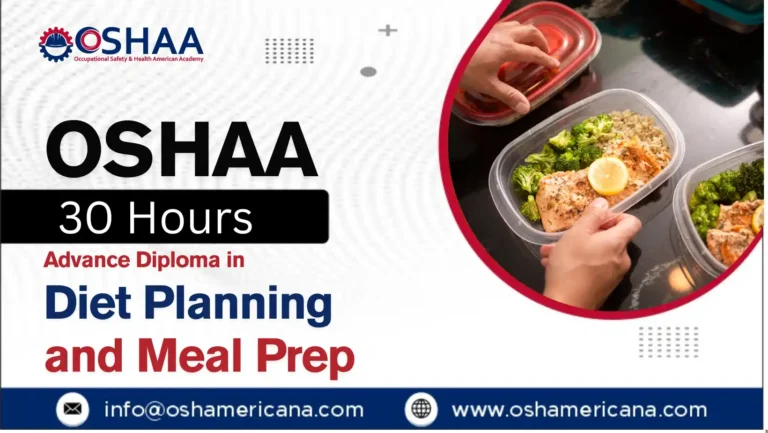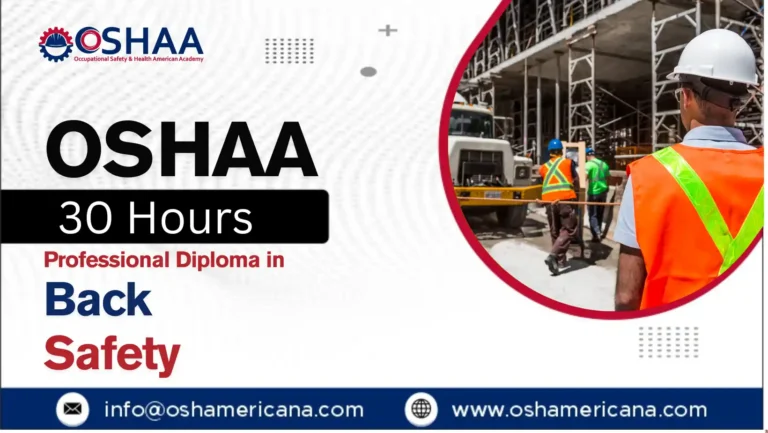Food safety and hygiene are critical components of the food industry. Whether you’re working in food production, food service, or food retail, maintaining high standards of hygiene and safety is crucial to protecting consumer health and ensuring compliance with regulations. The OSHAA 30-Hours Professional Diploma in Food Safety and Hygiene course is designed to provide in-depth knowledge and practical skills needed to manage food safety risks effectively.
In the food industry, improper handling, storage, or preparation of food can lead to contamination, resulting in foodborne illnesses. These illnesses can have severe consequences for public health, cause reputational damage to businesses, and lead to costly legal actions. By adhering to food safety and hygiene standards, businesses can reduce the risk of contamination and ensure that they are operating within the boundaries of UK food safety regulations.
The OSHAA 30-Hours Professional Diploma in Food Safety and Hygiene course is essential for anyone working in the food industry who wants to improve food safety standards and ensure compliance with food safety regulations. By equipping professionals with the knowledge to manage food safety risks effectively, this course plays a crucial role in promoting a safer, healthier food environment for both employees and consumers.
Whether you’re a food manager, chef, or production worker, this course provides the skills and qualifications needed to advance your career and make a positive impact on food safety practices in your workplace. Don’t wait—sign up for the OSHAA 30-Hours Professional Diploma in Food Safety and Hygiene course today to enhance your skills and ensure a safe food environment.
OSHAA 30-Hours Professional Diploma in Food Safety and Hygiene
Study Units
Learning Outcomes
- Introduction to Food Safety and Hygiene (3 hours)
- Understand the fundamental principles of food safety and hygiene.
- Recognise the importance of food safety in preventing foodborne illnesses and contamination.
- Identify the legal and regulatory requirements for food safety in the UK.
- Comprehend the key roles and responsibilities of food handlers in maintaining safe practices.
- Types of Foodborne Hazards (4 hours)
- Identify different types of foodborne hazards: biological, chemical, and physical.
- Understand the potential risks associated with each hazard type and how they affect food safety.
- Learn about common foodborne illnesses caused by contaminants such as bacteria, viruses, and parasites.
- Develop the skills to recognise and control hazards in various stages of food production and handling.
- Safe Food Handling Practices (4 hours)
- Understand the key principles for safe food handling, including temperature control and cross-contamination prevention.
- Learn the correct methods for storing, preparing, and cooking food to minimise contamination risks.
- Identify critical areas for food safety, such as raw food handling and segregation.
- Apply best practices for maintaining food safety in different food environments.
- Cleaning and Sanitisation in Food Safety (4 hours)
- Understand the importance of effective cleaning and sanitisation in food safety.
- Learn the types of cleaning agents used and their specific applications in food environments.
- Master proper cleaning and sanitisation procedures for food preparation areas, equipment, and utensils.
- Develop skills to maintain a hygienic and safe environment in food handling areas.
- Personal Hygiene and Workplace Practices (4 hours)
- Recognise the role of personal hygiene in preventing food contamination.
- Understand proper handwashing techniques and hygiene practices for food handlers.
- Learn about the necessary hygiene standards for uniforms, protective equipment, and health checks.
- Identify how personal cleanliness impacts overall food safety in the workplace.
- Food Safety Management Systems (5 hours)
- Understand the key principles and benefits of implementing a Food Safety Management System (FSMS).
- Learn about the structure of HACCP (Hazard Analysis and Critical Control Points) and how to apply it in food safety.
- Develop skills to assess food safety risks and create appropriate control measures for food production environments.
- Gain knowledge of monitoring, reviewing, and continually improving food safety practices.
- Health and Safety Protocols in Food Environments (3 hours)
- Understand health and safety regulations in the food industry and their relationship to food safety.
- Identify common health and safety risks in food environments and learn how to address them.
- Learn proper ergonomic techniques and safe handling of food production equipment.
- Understand emergency procedures and response protocols for accidents and illnesses in food environments.
- Food Safety Audits and Inspections (3 hours)
- Learn about the process of conducting food safety audits and inspections.
- Understand how to prepare for food safety audits, including necessary documentation and record-keeping practices.
- Recognise the role of audits in improving food safety standards and ensuring compliance.
- Develop skills to respond to audit findings and implement corrective actions to maintain high food safety standards.
- Comprehensive Knowledge of Food Safety: This course provides participants with a thorough understanding of food safety principles, ensuring they are equipped to handle food safely and prevent contamination at every stage of food production, from handling to service.
- Compliance with Legal Requirements: Participants will gain the necessary knowledge of UK food safety regulations and legal requirements, helping them ensure compliance with national standards and avoid legal issues related to food safety.
- Enhanced Risk Management Skills: With in-depth training on identifying, assessing, and controlling foodborne hazards, participants will develop critical risk management skills, enabling them to mitigate potential hazards in food environments effectively.
- Practical Application in Various Environments: The course covers food safety in a variety of food sectors, including catering, food retail, and food manufacturing, making it highly relevant for workers in diverse settings.
- Improved Hygiene Practices: By learning proper hygiene standards, including personal hygiene, cleaning, and sanitisation techniques, participants will significantly reduce the risk of foodborne illnesses and improve overall workplace hygiene.
- Food Safety Management System (FSMS) Knowledge: The course introduces participants to Food Safety Management Systems (FSMS) and teaches them how to implement systems such as HACCP (Hazard Analysis and Critical Control Points), essential for maintaining consistent food safety practices.
- Emergency Preparedness: Participants will learn how to manage health and safety risks, respond to emergencies, and handle accidents in food environments, ensuring they are ready for any situation that may arise.
- Audit and Inspection Readiness: By understanding food safety audits and inspections, participants will be better prepared for external reviews, ensuring their establishments meet the highest food safety standards and maintain certification.
- Improved Career Opportunities: Completing this course will enhance participants’ qualifications, making them more competitive in the job market and increasing their chances of securing roles in food safety, quality assurance, and management.
- Contribution to Public Health: With the knowledge gained from this course, participants will play an active role in safeguarding public health by ensuring that food is prepared, handled, and stored safely, helping to prevent foodborne illnesses in the community.
By completing the OSHAA 30-Hours Professional Diploma in Food Safety and Hygiene course, participants will gain valuable skills and expertise to enhance food safety practices, comply with legal standards, and improve the overall quality of food safety management in their workplaces.
The OSHAA 30-Hours Professional Diploma in Food Safety and Hygiene course is ideal for a wide range of professionals working in the food industry. This includes:
- Food Handlers: Individuals involved in food preparation, cooking, and service, including chefs, kitchen staff, and waitstaff, who need to understand food safety practices to ensure the health and safety of customers.
- Food Safety Managers: Those responsible for overseeing food safety protocols within restaurants, food factories, catering services, and other food establishments. This course equips them with the skills to implement and monitor food safety management systems effectively.
- Catering Professionals: Catering managers, event organisers, and food service staff working in large-scale catering environments such as corporate events, weddings, or institutional kitchens, where high standards of food safety are critical.
- Food Business Owners: Entrepreneurs and business owners operating food-related businesses, including cafes, restaurants, takeaways, or food trucks, who need to ensure compliance with food safety laws and maintain high hygiene standards.
- Quality Assurance and Compliance Officers: Professionals responsible for ensuring food quality and safety, conducting inspections, and ensuring compliance with local and international food safety regulations.
- Supervisors and Team Leaders: Supervisors overseeing food production or service teams, who need to implement food safety training and ensure that food safety practices are followed across their teams.
- Health and Safety Officers: Individuals tasked with maintaining health and safety standards in the workplace, particularly within food-related industries, where foodborne hazards and contamination must be managed properly.
- New Entrants in the Food Industry: Anyone new to the food sector who wants to start a career in food safety, handling, or food management, and seeks a comprehensive introduction to food safety practices.
- Healthcare Providers: Professionals working in hospitals, nursing homes, or other healthcare facilities where special attention to food safety is essential, particularly for vulnerable individuals.
This course is perfect for anyone aiming to enhance their knowledge and expertise in food safety and hygiene, ensuring they can uphold the highest standards of food safety in their respective roles.







